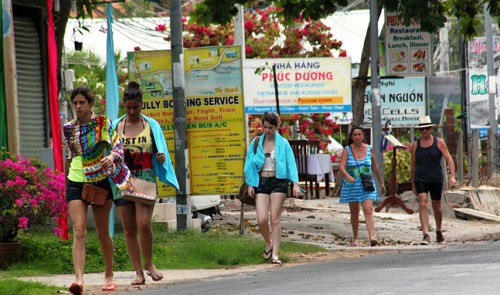The “Russian Village,” also known as “Vietnam’s Moscow,” in Mui Ne resort town in central Vietnam’s Binh Thuan Province has faced intense competition from other local tourist destinations and is experiencing a notable drop in Russian tourists.
According to the Vietnam National Administration of Tourism, though the number of Russian tourists to Vietnam has seen a rise of some 35 percent within the first four months of 2014 compared to the same period last year, the number of tourists from Russia to Binh Thuan has seen a mere increase of 22 percent.
The number tends to have been on the decline since early this year, with Russian arrivals to the province going down by almost 28 percent last month in comparison with January.
Nguyen Dinh Chieu Street in Mui Ne is lined with shops, restaurants, and tourism service companies that have signs and menus in Russian only.
Foreigners, most of whom are Russian, are often seen walking along the street back to their hotel rooms after having a swim in the sea or heading for the shopping centers.
An attendant at Minh Loc eatery opposite Ham Tien river dyke said that most shops in the area rely on the Russian tourists, who are long-duration vacationers and shop frequently.
“However, the shops here are receiving less Russian tourists since earlier this year,” he noted.
Tran Anh Thi, CEO of four-star resort The Sailing Bay in Mui Ne, said that the area was packed with Russian tourists some three or four years ago.
“As the number of Russian tourists drops, many resorts will be faced with considerable difficulty adapting their catering and marketing styles to tourists from other countries, while domestic travelers only peak in the summertime,” Thi noted.
Nguyen Duc Tan, CEO of Focus Travel Co., put the drop down to the launch of airports in Cam Ranh in central Khanh Hoa Province and Phu Quoc Island off southern Kien Giang Province.
Previously, flights carried Russian tourists to Ho Chi Minh City. They then often chose to go to nearby Mui Ne by bus or car. Now that airports in other areas have been built, charter flights take Russian tourists directly to such tourist spots as Khanh Hoa’s Nha Trang City or Phu Quoc instead of Mui Ne. The town is thus no longer the top choice for tour companies, Tan elaborated.
Hoang Thi Phong Thu, from Pegas Co., which sent more than 54 percent of Russian tourists to Vietnam last year, announced that this year the company plans to focus on direct flights to Nha Trang or Phu Quoc and take fewer tourists to Binh Thuan.
In Nha Trang alone, the company booked over 500 five-star rooms and dozens of three-star rooms per day to cater to Russian tourists.
Nguyen Van Khoa, chair of the provincial Tourism Association, stressed that although Pegas Co.’s decision to stop sending Russian tourists to Binh Thuan would hurt local service providers, they should have predicted the change and been on the lookout for new potential markets.
“The association members have also joined international tourism fairs and tried to seek new partners. Local tour providers, resorts, and hotels should divide among themselves various types of tourists and avoid arranging Russians and tourists from other European countries to stay together to provide the best possible services in accordance with the segments’ typical demands,” Khoa stressed.
Hoang Huu Loc, chair of Saigontourist, a major local tour provider, said that apart from the limited number of freelance tourists, local providers mostly rely on tourists consigned by their partners.
According to the statistics from the Binh Thuan Department of Culture, Sports and Tourism, the province has received some 61,000 Russian tourists within the first four months of 2014.
However, the number tends to drop gradually, with 17,535 tourists in January, 15,803 in February, and 15,117 in March.
In April the province welcomed a mere 12,634 Russian tourists, a 28 percent drop compared to January.
Ngo Minh Chinh, director of the department, said that the province is also seeking other major partners specializing in Russian tourists.
The province is set to dispatch a team to Russia this September to better promote its tourism potentials and seek new partners.






















































